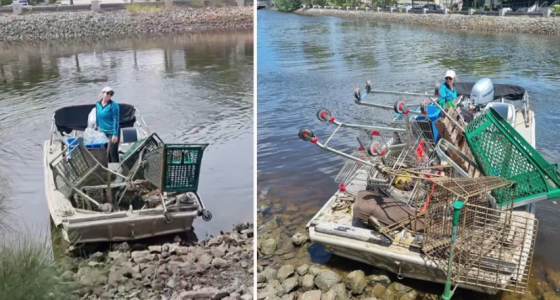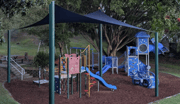Shocking discovery at river bottom traces back to Woolworths: 'Don’t be fooled'
By
VanessaC
- Replies 36
The Australian landscape is a treasure trove of natural beauty, but a worrying trend has been tarnishing its charm.
Ian Thomson, a Cleaning Specialist from environmental advocacy group Ocean Crusaders, has been on a mission to halt the dumping of supermarket trolleys in our parks and waterways—a problem that's costing Aussie shoppers thousands of dollars annually.
However, the issue has been exacerbated by Woolworths' promise for 'a greener future' and their introduction of so-called environmentally friendly, recyclable trolleys.
Thomson and his Brisbane-based team say they retrieve an average of 300 trolleys annually from rivers and lakes across Brisbane, Sydney, and Melbourne.
While traditional metal trolleys can often be returned and reused, the plastic ones from Woolworths—purportedly made from 74 plastic milk bottles—often can't be.
'Don't be fooled,' Ocean Crusaders wrote on their social media page.
'There are no certificates to prove their claims of 74 milk bottles in every trolley, but do the maths.'
The plastic trolleys are more prone to breakage, according to Thomson.
'They're really light, a lot lighter than the metal ones, and I've seen plenty of them broken,' Thomson added.
'They're also getting stuck together [after we recover them], which also damages them.'
'You didn't have that with the metal ones.'
Each trolley costs roughly $300 to replace, a cost that Thomson said is often passed onto consumers through their grocery bills.
He also claimed that most stores 'don't do much' to recover lost trolleys or at least broken parts.
Thomson explained that if a plastic trolley is damaged, Woolworths will simply 'undo the bolts and put a new crate on top of [the metal base] and then just throw the other trolley away'.
This, he claimed, is a cheaper method for the supermarket giant, but it's not environmentally friendly.
'If they are going to lose trolleys, they shouldn't be a disposable item, it's not really good for the environment.'
In a video posted on the Ocean Crusader's Facebook page, Thomson called out Woolworths over its 'claim to be pushing for a greener future.'
He showed a few dozen trolleys—both broken and intact—which his team recently retrieved from the Cornmeal Creek in Maroochydore.
Thomson was told by the manager at the local Woolies store that they're missing about 150 trolleys.
'That's $45,000 consumers are paying in their groceries at just one store,' he claimed.
Video source: Facebook / Ocean Crusaders.
Thomson believes that a simple solution to the problem would be to introduce a token or coin system like what ALDI has in place, which would 'reduce the amount of trolleys in the environment'.
'They could make those tokens out of recycled plastic and even have their branding on it, but they won't because they're worried about backlash,' he said.
Woolworths previously said that their shopping trolleys are made of recycled plastic and are more environmentally friendly.
When asked about Thomson's claims, including why Woolworths switched to plastic trolleys and if they'd consider using tokens, the supermarket declined to answer directly.
However, a spokesperson did confirm that broken baskets returned to them are 'sent back to where the trolleys are manufactured, melted back down and then remoulded into a brand new trolley'.
Regarding trolley dumping in general, a Woolies spokesperson said that the 'vast majority [of people] do the right thing in returning them'.
'We understand abandoned trolleys can be a nuisance, and that's why we invest millions in collection services to help mitigate their impact in the community,' a spokesperson said.
'We work closely with dedicated collection contractors who respond quickly to reports of abandoned trolleys to return them to our stores.'
'They also conduct regular sweeps for abandoned trolleys in the streets surrounding our stores.'
It is understood that the supermarket giant is partnered with Trolley Tracker—a service that allows members of the public to report abandoned trolleys.
 What are your thoughts on this issue, members? Have you noticed an increase in abandoned trolleys in your local area? Share your thoughts and stories in the comments below.
What are your thoughts on this issue, members? Have you noticed an increase in abandoned trolleys in your local area? Share your thoughts and stories in the comments below.
Ian Thomson, a Cleaning Specialist from environmental advocacy group Ocean Crusaders, has been on a mission to halt the dumping of supermarket trolleys in our parks and waterways—a problem that's costing Aussie shoppers thousands of dollars annually.
However, the issue has been exacerbated by Woolworths' promise for 'a greener future' and their introduction of so-called environmentally friendly, recyclable trolleys.
Thomson and his Brisbane-based team say they retrieve an average of 300 trolleys annually from rivers and lakes across Brisbane, Sydney, and Melbourne.
While traditional metal trolleys can often be returned and reused, the plastic ones from Woolworths—purportedly made from 74 plastic milk bottles—often can't be.
'Don't be fooled,' Ocean Crusaders wrote on their social media page.
'There are no certificates to prove their claims of 74 milk bottles in every trolley, but do the maths.'
The plastic trolleys are more prone to breakage, according to Thomson.
'They're really light, a lot lighter than the metal ones, and I've seen plenty of them broken,' Thomson added.
'They're also getting stuck together [after we recover them], which also damages them.'
'You didn't have that with the metal ones.'
Each trolley costs roughly $300 to replace, a cost that Thomson said is often passed onto consumers through their grocery bills.
He also claimed that most stores 'don't do much' to recover lost trolleys or at least broken parts.
Thomson explained that if a plastic trolley is damaged, Woolworths will simply 'undo the bolts and put a new crate on top of [the metal base] and then just throw the other trolley away'.
This, he claimed, is a cheaper method for the supermarket giant, but it's not environmentally friendly.
'If they are going to lose trolleys, they shouldn't be a disposable item, it's not really good for the environment.'
In a video posted on the Ocean Crusader's Facebook page, Thomson called out Woolworths over its 'claim to be pushing for a greener future.'
He showed a few dozen trolleys—both broken and intact—which his team recently retrieved from the Cornmeal Creek in Maroochydore.
Thomson was told by the manager at the local Woolies store that they're missing about 150 trolleys.
'That's $45,000 consumers are paying in their groceries at just one store,' he claimed.
Video source: Facebook / Ocean Crusaders.
Thomson believes that a simple solution to the problem would be to introduce a token or coin system like what ALDI has in place, which would 'reduce the amount of trolleys in the environment'.
'They could make those tokens out of recycled plastic and even have their branding on it, but they won't because they're worried about backlash,' he said.
Woolworths previously said that their shopping trolleys are made of recycled plastic and are more environmentally friendly.
When asked about Thomson's claims, including why Woolworths switched to plastic trolleys and if they'd consider using tokens, the supermarket declined to answer directly.
However, a spokesperson did confirm that broken baskets returned to them are 'sent back to where the trolleys are manufactured, melted back down and then remoulded into a brand new trolley'.
Regarding trolley dumping in general, a Woolies spokesperson said that the 'vast majority [of people] do the right thing in returning them'.
'We understand abandoned trolleys can be a nuisance, and that's why we invest millions in collection services to help mitigate their impact in the community,' a spokesperson said.
'We work closely with dedicated collection contractors who respond quickly to reports of abandoned trolleys to return them to our stores.'
'They also conduct regular sweeps for abandoned trolleys in the streets surrounding our stores.'
It is understood that the supermarket giant is partnered with Trolley Tracker—a service that allows members of the public to report abandoned trolleys.
Key Takeaways
- Woolworths' recyclable shopping trolleys, introduced in 2020, have been criticised by a cleaning specialist for being disposable and potentially harmful to the environment.
- Ocean Crusaders, a cleaning team from Brisbane, regularly finds and retrieves dumped trolleys from waterways, stating that plastic trolleys cannot always be recycled like traditional metal ones.
- Ian Thomson of Ocean Crusaders claimed the cost of replacing lost or damaged trolleys is passed on to consumers through grocery prices, with each plastic trolley costing around $300 to replace.
- Woolworths asserted that collected broken trolleys are returned to the manufacturer to be melted down and remoulded, and highlighted its investment in collection services to mitigate the impact of abandoned trolleys in the community.








